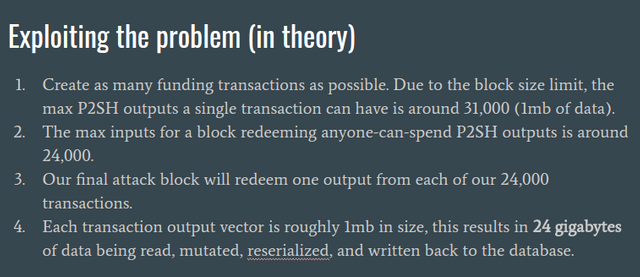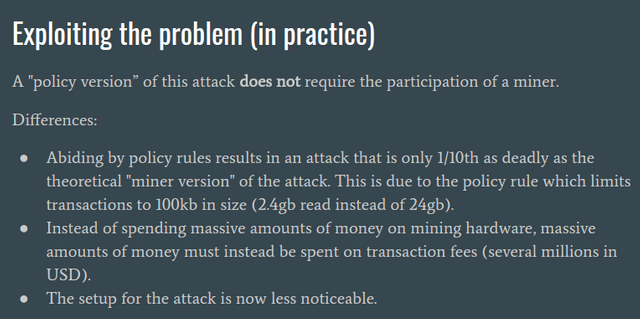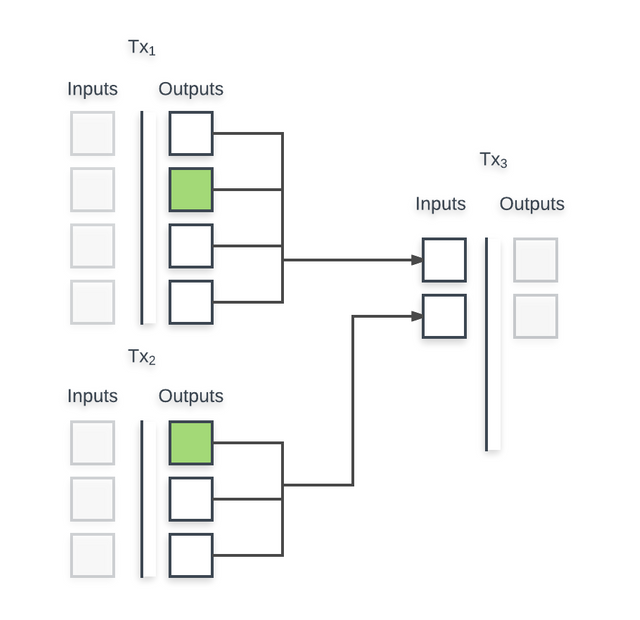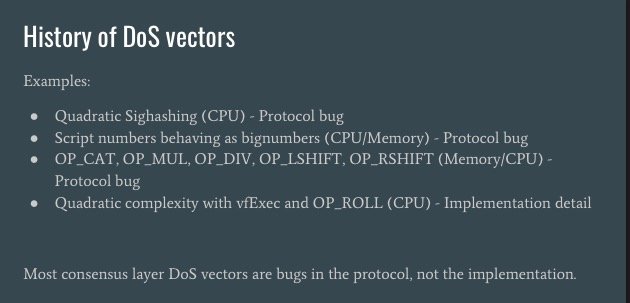
At the Breaking Bitcoin Conference in Paris last weekend, speakers from around the world gave talks about breaking down the technicals of different implementations such as Segwit2x, Bitcoin Unlimited, and IOTA.
The most controversial talk was given by alternative Bitcoin implementation developer, Christopher Jeffrey, who revealed to a live audience of about 200 developers, academics, and professionals in the Bitcoin space how he broke the default Bitcoin implementation, bitcoind, better known as Bitcoin Core.
He drove the point home that the software ecosystem in the Bitcoin protocol is glaringly centralized. While Reddit and Twitter conversations focus on the threat to decentralization that miners pose to Bitcoin, Jeffrey highlighted a less popular, though equally harrowing threat: development centralization.
More than 99% of the Bitcoin network today runs Bitcoin Core, which is the default software implementation served by the package managers in most major operating systems. Jeffrey drove this point home by giving a poignant live demonstration.
Opening his talk, Pitfalls of Consensus Implementation, Jeffrey demonstrated a denial-of-service (DoS) attack by running a script which caused bitcoind nodes to allocate excessive amounts of memory, causing them to grind to a halt. This was a successful out-of-memory (OOM) attack executed in the Bitcoin testnet.
This OOM attack on Bitcoin Core, dubbed Corebleed, focuses on machine details, abusing memory, CPU, and disk I/O bottlenecks. This, combined with targeting the consensus layer, “which cannot be ignored by nodes,” Jeffrey notes, would break Bitcoin by bricking the nodes that were running Core software.
Theoretically, if this denial-of-service (DoS) vector were exploited in mainnet, it would shut down a significant portion of the nodes running Bitcoin. Only those nodes backed by beefy servers could survive this attack. However, Jeffrey claims that this would take months to set up.
There are two versions of this attack: a miner version and a non-miner version. The miner version remains strictly theoretica, simply because it is cost prohibitive to execute.

Slide from Pitfalls of Consensus Implementation, by Christopher Jeffrey
This theoretical miner version of the attack would result in 24 gigabytes of data read into memory, and that is the number we would take at face value. In reality though, Jeffrey emphasized, due to the C++ heap, “the memory usage is amplified 3 or 4 times, so it’s probably more like 100 gb.” To pull off this attack, you would essentially have to be a miner. Moreover, the setup phase would be very obvious and people would notice it right away.
The non-miner version of this attack is relatively simpler, more obscure, and less costly to pull off. Done in practice, it would take months to setup and millions of dollars in USD to take down the Bitcoin network as we know it.
It's not a lot of money or time if we consider large organizations wanting to shut down Bitcoin for the sake it, a point Jeffrey drove home in demonstrating this on the majority implementation with the lion’s share of the market. Wipe out Bitcoin Core and you wipe out more than 90% of Bitcoin.

This OOM attack is done by going after “the heart and soul” of Bitcoin: Unspent Transaction Outputs (UTXOs). Mechanically, Jeffrey explains, indexing new UTXOs requires all of the outputs to be stored under the same database record each transaction.

When a spend occurs via an “input,” a single output in the UTXO index is referenced (in green). However, spending a “vector-based UTXO,” as it’s called, requires that a spend input reads the entire database record and stored into memory until the process has been completed.
Jeffrey walked the audience through a key distinction that even seasoned developers have difficulty grasping the subtleties of: protocol versus implementation details which cause network defects.

As this attack is possible due to an implementation detail, it is easily remedied by diversifying the Bitcoin software environment, where multiple implementations with a spread out market share were running in parallel.
The list of alternative implementations is short but varied. Bcoin.io is an alternative to the Bitcoin reference client written in node.js by Jeffrey himself. Btcd is used by lnd, the Lightning Network, written in Go by Dave Collins, Core developer of Decred. Libbitcoin is another, written in C++ by Amir Taaki, who was also present at Breaking Bitcoin. These, along with several other alternative implementations, can be paths toward decentralizing the development space in Bitcoin, leading to a resilient network that couldn't be taken down by a single virus or attack.
All implementations that are forked from Bitcoin Core are vulnerable to this attack. Implementations like Bitcoin Cash, Zcash, and other alternative currencies fall in this category.
However, Bitcoin Core developer, Pieter Wuille, also proposed a performance boost to Bitcoin Core called pertxout in Apri, Core 0.15. While the upgrade is as yet untested, this upgrade from the old vector-based UTXO model to a pertxout model inadvertently amends the OOM attack.
wow... I'm not really sure what to say. Thanks for sharing that post. It shows that while cryptocurrency will be the future - it still has a lot of risk involved.
Downvoting a post can decrease pending rewards and make it less visible. Common reasons:
Submit
Great post, I have hear about this but have not found an article explaining it so well.
Software errors like this are a major problem for any new system, especially for blockchains. Open-sourcing is a good way to have hundreds of developers search for errors, but it also creates a false sense of security. There are still many errors found in Linux or similar software that has been open for decades.
With blockchains, it is a little bit different, because only the protocol is fixed, the implementation can be very individual. The concept of Bitcoin is, that you should not trust any developer to provide you with secure code, the blockchain is the only and absolute truth. I would like to see more implementations that do not rely on Bitcoin Core to decentralize everything a but more.
Downvoting a post can decrease pending rewards and make it less visible. Common reasons:
Submit
Nice post @bravenewcoin. Hope new version of bitcoin core may have some improvements.
Downvoting a post can decrease pending rewards and make it less visible. Common reasons:
Submit
I think is important to address this possible attack asap before a corrupted government might exploit it.
Downvoting a post can decrease pending rewards and make it less visible. Common reasons:
Submit
Great posts can be useful can be an experience. Hopefully be a friend who can help me to like you ..... to dream and hope to be achieved. Like @sinta need friend support. Best regards.
Downvoting a post can decrease pending rewards and make it less visible. Common reasons:
Submit
I'm confused what's going on here hahahaha , sorry u take good notes and make a good article but since I'm new to all of this I don't understand much I guess I should do more research about this , just one thing ? Is this new thing done to break BTC or is it something new to make it better ?
Downvoting a post can decrease pending rewards and make it less visible. Common reasons:
Submit
They would have been, although the fixes for this issue had been released in the other Bitcoin clients. Core had the fix (they originally fixed it as an unintentional byproduct of another change), it just wasn't pushed out for release by the time of the talk.
Downvoting a post can decrease pending rewards and make it less visible. Common reasons:
Submit
Damn, you take good notes!
Downvoting a post can decrease pending rewards and make it less visible. Common reasons:
Submit
Really interesting article, thanks!
One of the issue with Bitcoin is that upgrades can be long to come even for security ones. As noted in some other reply, some alt-coins have already fix the issue.
Downvoting a post can decrease pending rewards and make it less visible. Common reasons:
Submit
Thank you for sharing
Downvoting a post can decrease pending rewards and make it less visible. Common reasons:
Submit
@bravenewcoin This is awesome! Love it.
Downvoting a post can decrease pending rewards and make it less visible. Common reasons:
Submit
Gracias por la información, saludos!!
Downvoting a post can decrease pending rewards and make it less visible. Common reasons:
Submit
Congratulations @bravenewcoinr, this post is the forth most rewarded post (based on pending payouts) in the last 12 hours written by a User account holder (accounts that hold between 0.1 and 1.0 Mega Vests). The total number of posts by User account holders during this period was 1242 and the total pending payments to posts in this category was 2019.88. To see the full list of highest paid posts across all accounts categories, click here. If you do not wish to receive these messages in future, please reply stop to this comment.
Downvoting a post can decrease pending rewards and make it less visible. Common reasons:
Submit